Scoops
Dec 28, 2007
Twenty years ago, on a campaign trip in rural Pakistan in October 1987, Benazir Bhutto told me of her concern about the long-term effect of Afghan refugees who had set up safe houses, stored munitions and created networks in her country.
We talked for an hour in an interview I videotaped. It was the day after I traveled with her on a political procession in Sailkot, in the Punjab, northern Pakistan, where she was mobbed by supporters.
She was prescient about the impact of the Islamic Afghanis who had arrived in Pakistan during the war with the Soviet-supported government.
She said a long-term domestic fallout would be that even if Afghanistan today is solved and guaranteed by both superpowers, what about the future? Because the network has been created.
Theater
Inter Press Service (IPS), Dec 14, 2007
As the 1994 genocide in Rwanda slips into the dark hole of history, the U.S. playwright J.T. Rogers’ The Overwhelming reminds one how it happened and how both the moral, the complicit and the cynical in the West were present in the killing fields. 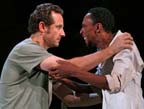
In Rogers’ fictional story, a U.S. family visits Rwanda in 1994. Jack, a professor, accompanied by wife Linda and son Geoffrey, is researching a book about grassroots activists and comes to interview his old college roommate, Joseph, a Tutsi who runs a children’s AIDS clinic. But Joseph has disappeared.
Blog
Dec 13, 2007
I chatted for a few minutes with Italian President Giorgio Napolitano  after he spoke this morning at a Council on Foreign Relations breakfast. He agreed that there is a problem posed by offshore financial centers and pointed to concern in Europe reflected in a recent joint letter on the subject by the UK, France and Germany.
after he spoke this morning at a Council on Foreign Relations breakfast. He agreed that there is a problem posed by offshore financial centers and pointed to concern in Europe reflected in a recent joint letter on the subject by the UK, France and Germany.
Napolitano is an extraordinary man who served nearly 40 years in the Italian parliament and was a leader of the Italian Communist Party, the PCI, helping to move it out of the Stalinist camp to social democracy.
Richard Gardner, US ambassador to Italy 1977 to 81, who presided over the meeting, told me that he had tried to persuade Henry Kissinger that Napolitano was a social democrat. Gardner said that Kissinger never could grasp that.
Scoops
Inter Press Service (IPS), Dec 5, 2007
There is irony in the recent announcement by Peru’s President Alan GarcÃa that he would publish the names of 1,800 freed terrorists, so that people might recognise and report them if they were participating in anti-state conspiracies. His list includes people imprisoned on false charges or never convicted or sentenced.
One name that is not on the list is that of Alan GarcÃa.  However, according to a declassified U.S. government document, GarcÃa, during his first administration from 1985-1990, gave instructions to terror squads organised by his political party to assassinate suspected leftists. Victims included trade unionists and other civil society leaders.
However, according to a declassified U.S. government document, GarcÃa, during his first administration from 1985-1990, gave instructions to terror squads organised by his political party to assassinate suspected leftists. Victims included trade unionists and other civil society leaders.
This writer discovered the document, and it was declassified at her request. It is posted following the full article.
Theater
Plays show western complicity in Nigeria and Rwanda violence.
Dec 1, 2007
 Murderous conflicts in Africa are dramatized in two American plays off-Broadway that vividly call up the clashes in the oil region of Nigeria and the Rwanda genocide of over a decade ago. In both cases playwrights show inter-communal violence heightened by western interests‘ actions or neglect.
Murderous conflicts in Africa are dramatized in two American plays off-Broadway that vividly call up the clashes in the oil region of Nigeria and the Rwanda genocide of over a decade ago. In both cases playwrights show inter-communal violence heightened by western interests‘ actions or neglect.
The one-man “Tings dey happen” by Dan Hoyle is most successful in presenting the characters of the Niger Delta, from militants demanding their share of oil wealth to the self-serving American ambassador and expatriates. “The Overwhelming,” by J.T. Rogers, also uses the “American visitor” device, though the personal stories seem trivial in the context of events.
Blog, Corporate Abuses, Offshore
Dec 1, 2007
When there’s a financial crisis tied to lack of transparency, follow the culprits offshore. Evidence comes out now that this is true about the subprime debacle.
Reuters reports that a German bank is implementing accounting changes including consolidation of an offshore conduit whose soured investments triggered a government-led rescue. The offshore operation was set up to invest in subprime mortgages.
Pam Martens in Counterpunch points out that, Citigroup, is discovered to have stashed away over $80 billion of Byzantine securities off its balance sheet in secretive Cayman Islands vehicles with an impenetrable curtain around them.
Among those securities count subprimes. Citigroup has $55 billion of subprime exposure and in November said it would write down up to $11 billion in subprime losses. Goldman Sachs said that won’t be all, that the bank may have to write off $15 billion.
Theater
Inter Press Service (IPS), Nov 15, 2007
New York stages are filled with strong women asserting themselves forcefully in musicals and classic comedy — forms that speak to the popular culture. 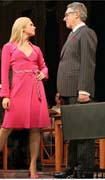
Five current hit plays that depict strong women are Legally Blonde, Avenue Q, Xanadu, George Bernard Shaw’s classic, Pygmalion and Curtains.
Let’s start with the young college girls in Legally Blonde, a stage remake of a popular 2001 film that was part of the post-feminist girl power movement, when young women were fighting a men are what matter backlash that threatened their chances for career and independence.
Blog
Nov 3, 2007
Learning of General Pervez Musharraf‘s declaration of emergency rule (martial law) in Pakistan, I can‘t help but recall the gushing introduction of the general made by Citigroup honcho and Democratic financial eminence grise Robert Rubin when the dictator, who came to power in a military coup, spoke at the Sept 25, 2006 meeting of the Council on Foreign Relations. 
Rubin urged the audience to “understand a great deal more than those in our country tend to know about Pakistan, the Muslim world, the meaning of democracy in the context of countries very different from our own.”
Rubin‘s obsequious comments might be connected to the fact that Musharraf had appointed a top Citigroup official to be his finance minister, giving the bank privileged entrée into the country.
A question now for Robert Rubin: Just how do you fit martial law into your expansive meaning of democracy?
Blog, Offshore
Oct 23, 2007 – In the continuing saga of the Frigates of Taiwan, involving about $1 billion in bribes and kickbacks paid by the French company Thomson to win a bid on the sale of six war frigates to Taiwan in the early 90s, I asked French Finance Minister Christine Lagarde, at the Council on Foreign Relations yesterday, if she would continue the cover-up on a corruption case that could be the largest (known) in French history.
Madame Lagarde wasn’t sufficiently aware of the case that has been exhaustively reported by French print and broadcast media for more than a decade.
Offshore, Scoops

Oct 15, 2007
Click above to see a 6-minute video of Prof. Stiglitz, Nobel Laureate, former Chief Economist of the World Bank, former head of the Council of Economic Advisors to President Clinton. He explains what is wrong with tax havens.
The video was made by Lucy Komisar.
Blog, Offshore
Sept 29, 2007
It‘s that time of the year when the UN General Assembly opens and heads of state and foreign ministers meet up at parties and quiet gatherings and even give a few public speeches around town. A popular stop is the Council on Foreign Relations, where anyone representing an establishment view is assured of a warm welcome. 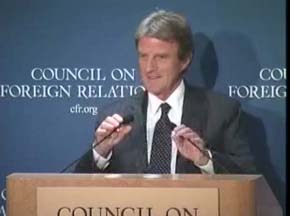
French Foreign Minister Bernard Kouchner, famous as the founder of Médecins Sans Frontieres (actually he was one of 12 doctor and journalist founders), spoke at the Council on Tuesday. In his introduction Felix Rohatyn, the prominent investment banker, US ambassador to France in 1997-2000 and now an advisor to the chairman of Lehman Brothers, said, “There are very few people who act according to their principles. Bernard Kouchner acts on his principles, and that‘s a very rare virtue, especially in a politician.”
I was hopeful that Minister Kouchner, a Socialist who has joined a conservative government, would display these principles in his answer to my question about a corruption scandal that could be the French Watergate. However, the minister displayed the not-so-rare political attribute of solidarity with high-level officials who want to suppress evidence of corruption.
Blog, Offshore
Sept 17, 2007
There’s an astonishing article in the Washington Post’s Business Section (Risk. Now They See It. Now You Don’t. Sept 16, 2007)
The Post, which has never, ever, railed against tax havens, is now suggesting that their use to cheat tax authorities and investors threatens the entire global financial system. Of course, it doesn’t put it so starkly, but that’s the gist.
The Post says, Over the past few years, major banks figured out how to use conduits and structured investment vehicles to earn big fees while playing cute little games of tax and regulatory arbitrage and keeping it all pretty much hidden from investors.
Where does The Post think those off-balance-sheet investment vehicles are? Most of Enron’s were in Grand Cayman. The Post should connect the dots. Tax and regulatory arbitrage plus hidden plus off-balance-sheet investment vehicles = offshore.
Why did regulators tolerate the use of offshore? Because global tax evasion and avoidance of regulation is something corporations want. That’s what offshore secrecy is for. Now, will Congress act, in spite of corporate power, when there is a threat to the entire global financial system?
Theater
Inter Press Service (IPS), Sept 13, 2007
In a new play by a Palestinian-American woman, two characters say in unison: Oppression is like a coin maker. You put in human beings, press the right buttons and watch them get squeezed, shrunk, flattened till they take the slim shape of a two-faced coin, one side is a martyr, the other a traitor. All the possibilities of a life get reduced to those paltry two.

In a strange coincidence — or maybe not so strange — that is also the theme of a play written in 1990 by an Israeli man. Both were commenting on the murderous violence that had engulfed Palestinians. Betty Shamieh wrote The Black Eyed after the 2001 attack on the World Trade Centre. Ilan Hatsor wrote The Masked a decade earlier during the first intifada. Both plays have made their way to off-Broadway in New York.
Corporate Abuses, Offshore, Scoops
Inter Press Service (IPS), Aug 30, 2007
U.S. officials from the Securities and Exchange Commission, the Justice Department and the Federal Bureau of Investigation met with Munich prosecutors this week regarding the 1.3-billion-dollar bribe fund run by Siemens, the German multinational technology company.
After talking to the Germans about tracking the financial flows of the largest illicit slush-fund ever discovered, the U.S. investigators would do well to visit Luxembourg on Germany’s western border.

There they could seek information from Clearstream, the international financial clearing house, that might tell them how Siemens moved so much money and where it went. That is because Siemens has the unusual status of being one of only four non-financial companies among 2,500 Clearstream members. It gained membership on the insistence of a former CEO who was fired after a scandal.
Corporate Abuses, Offshore, Scoops
Aug 15, 2007
Siemens, the German-based multinational technology company that made massive payoffs to get international contracts, has, according to the German press, a bribery slush fund of more than $1.3 billion.  It moved money through a network of front companies, mostly in offshore Liechtenstein and the United Arab Emirates. Siemens is being investigated by the U.S. Justice Department and the Securities and Exchange Commission as well as by public prosecutors in Germany and Italy.
It moved money through a network of front companies, mostly in offshore Liechtenstein and the United Arab Emirates. Siemens is being investigated by the U.S. Justice Department and the Securities and Exchange Commission as well as by public prosecutors in Germany and Italy.
How did Siemens officials move so much money about? Investigators ought to take a look at Siemens‘ transactions through Clearstream, the international financial clearing house in Luxembourg, whose clients do not undergo the same due diligence scrutiny that regular banks apply.
Siemens is one of only four non-financial companies (out of 2500) with Clearstream accounts. Here — published for the first time — are listings of Siemens’ Clearstream accounts for 1995, 2000 and 2001.
Theater
Inter Press Service (IPS), Aug 10, 2007
Two Broadway plays, Frost/Nixon and Talk Radio, expose how the media and its stars, at both the high and the low end, manipulate politics to turn news stories into emotional confrontations.
The goal in each case, of course, is to reach the highest entertainment level — and the biggest buck.
 Frost/Nixon by British playwright Peter Morgan takes place in 1977. British talk show host David Frost (Michael Sheen), trying desperately for a comeback, wheedles and bribes disgraced ex-President Richard Nixon (Frank Langella) to submit to hours of interviews whose high-spot turns out to be a confession to the crimes of Watergate.
Frost/Nixon by British playwright Peter Morgan takes place in 1977. British talk show host David Frost (Michael Sheen), trying desperately for a comeback, wheedles and bribes disgraced ex-President Richard Nixon (Frank Langella) to submit to hours of interviews whose high-spot turns out to be a confession to the crimes of Watergate.
Politics and psychology are a profitable combination. We see them again in Eric Bogosian’s Talk Radio, where Barry Champlain (Liev Schreiber) is the host of the call-in show, Night Talk.
Blog, Corporate Abuses, Offshore
Aug 1, 2007
Where did Rupert Murdoch get $5 billion to buy up the Wall St. Journal? Beyond normal profits, his coffers were stuffed by dodging taxes in the U.S. and elsewhere. Some of that is your money!
The Economist, in 1999, investigated Murdoch’s corporate tax affairs and discovered that a collection of 800 offshore companies help him cut corporate taxes to 6%!
Theater
IPS (Inter Press Service), July 5, 2007
The United States is famous as a country that denies the validity of class. But you’d get a different idea at theaters across New York, where two new plays and a revival look head-on at the way wealth, status and power affect people’s lives.
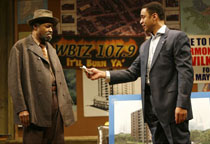
The new original works are Radio Golf and In The Heights, while the revival is A Moon for the Misbegotten. They’re either on Broadway or moving there shortly.
Offshore, Regulation & enforcement, Scoops
Speech to conference on Taming the Giant Corporation, organized by Ralph Nader and The Center for Study of Responsive Law, Washington DC, June 8, 2007
The tax haven racket is the biggest scam in the world. It‘s run by the international banks with the cooperation of the world‘s financial powers for the benefit of corporations and the mega-rich. This talk is about strategy, but first you have to know the target, and most Americans, including progressive activist Americans, don‘t know what I‘m going to tell you. And that‘s part of the problem.
Between 1996 and 2000, of U.S. and multi-national corporations operating in the United States, with assets of at least $250 million or sales of at least $50 million, nearly two-thirds paid no U.S. income tax. Over 90 percent reported owing taxes of under 5 percent. One year, six in ten paid less than a million.
This is the dirty little secret of globalization: the end of controls on capital flows and the expansion of the tax haven system from 25 years ago to where it has more than doubled to about 70 tax havens.
The system is a major reason for the growing inequality in the U.S. and between the West and the developing worlds.
The system has given the big banks and corporations and the super-rich mountains of hidden cash they use to control our political systems.
Offshore, Scoops
May 27, 2007
President Bush‘s attorney general, Alberto Gonzales, has come under fire for politicizing the U.S. Justice Department for his dismissals of eight U.S. attorneys, apparently because they didn‘t target Democrats. But using the Justice Department for political ends isn‘t simply an invention of Gonzales or of the President; it‘s an old Bush family tradition.
In politicizing the Justice Department, Bush takes a page from his father. The George H.W. Bush Justice Department 25 years ago balked at investigating and prosecuting the key players in the scandal of the criminal, terrorist-friendly bank, BCCI, and moved only, and in limited fashion, after New York District Attorney Robert Morgenthau forced its hand.
 Bush had a strong reason to want Justice to block pursuit of the case: the CIA used BCCI for its black ops, including funneling some of the $2 billion Washington sent to client Osama bin Laden and running money for the illegal Iran-Contra operation.
Bush had a strong reason to want Justice to block pursuit of the case: the CIA used BCCI for its black ops, including funneling some of the $2 billion Washington sent to client Osama bin Laden and running money for the illegal Iran-Contra operation.
Theater
Eugene O‘Neill‘s play is a sharp political commentary about class, poverty and gender. That overlays what director Howard Davies projects as a story of personal relationships, a male-female pas de deux, with an interfering father thrown in.

It is 1923. The 30-ish Josie Hogan (an assertive, moving, dignified Eve Best) is helping her self-involved father Paul (played by Colm Meaney with a sense of true male entitlement) scrape survival out of a hard scrabble Connecticut farm.
Josie and Paul see their “way out” as Jim Tyrone (Kevin Spacey), a rich, alcoholic, third-rate actor whose inheritance makes him the Hogans‘ landlord.
But the cards are really held by T. Stedman Harder (Billy Carter), the owner of a neighboring estate, who is defined by his pretentious first initial and his position as an executive with Standard Oil.
Theater
Inter Press Service (IPS) – May 25, 2007
The international focus on fundamentalist Islam might obscure the fact that western nations have their own experiences with fundamentalist religion — among them the country whose government has most targeted radical Islam, the United States.
As recently as 1999 the Kansas Board of Education voted to delete the teaching of evolution from the state’s science curriculum.

A sense of continuing conflict — not to mention the hardly-veiled contempt many educated people here have for the fundamentalists — is palpable among the New York audiences filling the Lyceum Theatre on Broadway to see a riveting star-studded production of Inherit the Wind. The production is a revival of the 1955 play by Jerome Lawrence and Robert E. Lee that tells the story of what came to be known as The Scopes Monkey Trial.
In the play, science teacher Bert Cates (Benjamin Walker) is jailed for the crime of explaining evolution to his students. Help comes quickly from a Baltimore newspaper which hires Henry Drummond (portrayed by Christopher Plummer as a wry, sophisticated lawyer) to defend the young man. To chronicle the story, it dispatches its prize reporter, smartly played by Denis O’Hare as a sarcastic, fast-talking cynic.
Blog
May 16, 2007
Paul Hewson, known as Bono, the rock star, is complaining that the seven wealthy nations in the G-7 which had promised to double aid to the developing world by 2010, are more than half behind target. The countries are the United States, Britain, Canada, France, Germany, Italy, and Japan. 
Bono‘s protest might be taken more seriously if he and his U2 band were not participating in the system that deprives developing countries of far more than western aid – much of which has to be repaid.
Bono is a tax dodger. As a result of a change in Irish law that limits the tax exemption for artists and musicians to a punitive $625,450, Bono’s U2 has moved its music publishing company registration to the Netherlands, where the tax on its multi-million dollar income will be about 5 percent. To dodge taxes on non-royalty income, Bono‘s company has used offshore nominees.
Theater
Inter Press Service (IPS), May 10, 2007
Conflict historically has aroused playwrights’ passions — think Aristophanes’ famous War and Peace trilogy written more than 2,000 years ago.
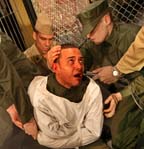 In that tradition, New York stage voices are being raised against war in two revivals that clearly retain their relevance today.
In that tradition, New York stage voices are being raised against war in two revivals that clearly retain their relevance today.
Journey’s End, a gripping play about World War I written in the 1920s, is spare and direct, unsettling the audience with the prosaic waiting game of war. And The Brig details the numbing banality of military cruelty as the Living Theatre revives its famous gritty production of the 1960s.
Theater
Kenneth Brown’s play The Brig, staged by The Living Theatre, is a numbing expression of the banality of cruelty institutionalized by the U.S. military.

A cell with five double-decker bunks is enclosed by a chain-link fence, and the area outside, concrete floor or gravel exercise yard, is separated from the audience by barbed wire. Ten men, who have committed unknown, apparently minor infractions, are confined for up to 30 days to suffer dehumanizing treatment at the hands of guards who punctuate their disapproval with punches to the stomach.
The guards turn basic minutiae of life – dressing, showering, shaving, smoking – into opportunities for control and humiliation. There is a Nazi sort of order, efficiency and gratuitous cruelty. The spectacle is a macabre dance, a cacophony of voices, repetition, and tension that sears and stuns audiences.



 after he spoke this morning at a Council on Foreign Relations breakfast. He agreed that there is a problem posed by offshore financial centers and pointed to concern in Europe reflected in a recent joint letter on the subject by the UK, France and Germany.
after he spoke this morning at a Council on Foreign Relations breakfast. He agreed that there is a problem posed by offshore financial centers and pointed to concern in Europe reflected in a recent joint letter on the subject by the UK, France and Germany. However, according to a declassified U.S. government document, GarcÃa, during his first administration from 1985-1990, gave instructions to terror squads organised by his political party to assassinate suspected leftists. Victims included trade unionists and other civil society leaders.
However, according to a declassified U.S. government document, GarcÃa, during his first administration from 1985-1990, gave instructions to terror squads organised by his political party to assassinate suspected leftists. Victims included trade unionists and other civil society leaders. Murderous conflicts in Africa are dramatized in two American plays off-Broadway that vividly call up the clashes in the oil region of Nigeria and the Rwanda genocide of over a decade ago. In both cases playwrights show inter-communal violence heightened by western interests‘ actions or neglect.
Murderous conflicts in Africa are dramatized in two American plays off-Broadway that vividly call up the clashes in the oil region of Nigeria and the Rwanda genocide of over a decade ago. In both cases playwrights show inter-communal violence heightened by western interests‘ actions or neglect.





 It moved money through a network of front companies, mostly in offshore Liechtenstein and the United Arab Emirates. Siemens is being investigated by the U.S. Justice Department and the Securities and Exchange Commission as well as by public prosecutors in Germany and Italy.
It moved money through a network of front companies, mostly in offshore Liechtenstein and the United Arab Emirates. Siemens is being investigated by the U.S. Justice Department and the Securities and Exchange Commission as well as by public prosecutors in Germany and Italy.  Frost/Nixon by British playwright Peter Morgan takes place in 1977. British talk show host David Frost (Michael Sheen), trying desperately for a comeback, wheedles and bribes disgraced ex-President Richard Nixon (Frank Langella) to submit to hours of interviews whose high-spot turns out to be a confession to the crimes of Watergate.
Frost/Nixon by British playwright Peter Morgan takes place in 1977. British talk show host David Frost (Michael Sheen), trying desperately for a comeback, wheedles and bribes disgraced ex-President Richard Nixon (Frank Langella) to submit to hours of interviews whose high-spot turns out to be a confession to the crimes of Watergate.
 Bush had a strong reason to want Justice to block pursuit of the case: the CIA used BCCI for its black ops, including funneling some of the $2 billion Washington sent to client Osama bin Laden and running money for the illegal Iran-Contra operation.
Bush had a strong reason to want Justice to block pursuit of the case: the CIA used BCCI for its black ops, including funneling some of the $2 billion Washington sent to client Osama bin Laden and running money for the illegal Iran-Contra operation.


 In that tradition, New York stage voices are being raised against war in two revivals that clearly retain their relevance today.
In that tradition, New York stage voices are being raised against war in two revivals that clearly retain their relevance today.